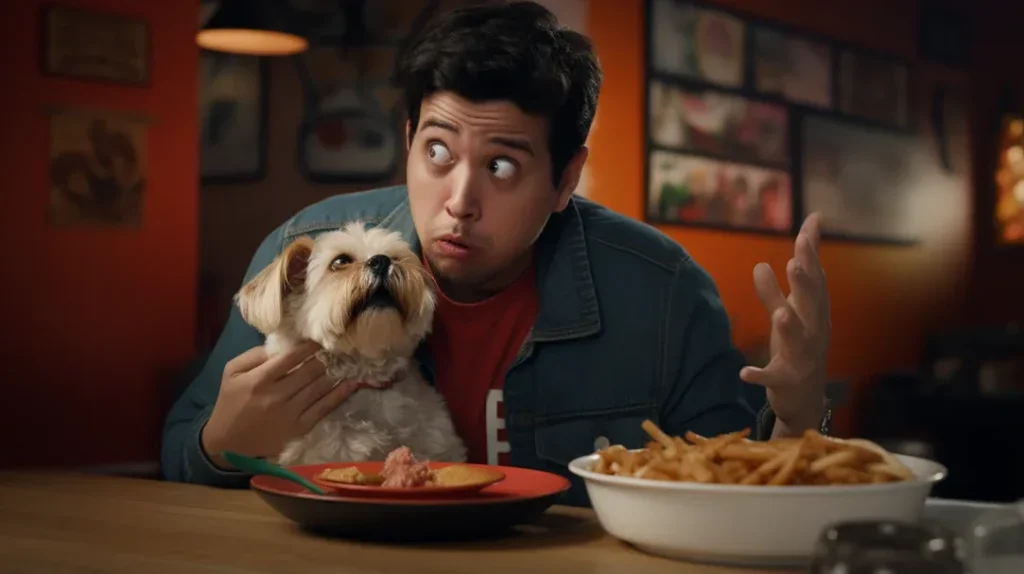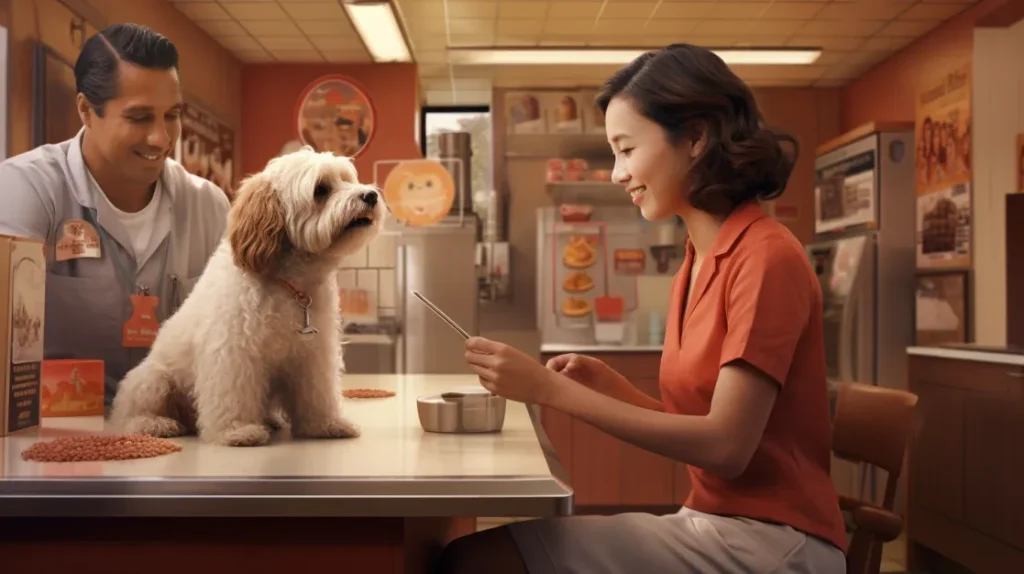Are you curious if your furry friend can indulge in delicious Panda Express orange chicken? Well, hold your horses! Before you toss a piece their way, it’s essential to understand the nutritional value of this popular dish and how it fits into your dog’s dietary needs.
This article will discuss the following: Can dog eat orange chicken? Risks of feeding dogs orange chicken, and offers safe alternatives.
So buckle up, and let’s dive into this tasty topic!
Key Takeaways Of “Can Dog Eat Orange Chicken”
- Orange chicken is not recommended for dogs due to its high-fat content, excessive sodium levels, and sugary sauce.
- Dogs have unique nutritional requirements, and not all human foods are safe to consume.
- Safe alternatives to orange chicken for dogs include plain, cooked chicken without seasoning or sauce and homemade dog food.
- When introducing new foods to a dog’s diet, starting with small portions, monitoring for any signs of allergies or digestive issues, and consulting a veterinarian for guidance are essential.
What is Panda Express?
Panda Express is a popular fast-food Chinese restaurant known for its signature dish, orange chicken. It offers a wide range of menu options, including various chicken, beef, and seafood dishes, noodles, and rice.
The orange chicken at Panda Express consists of dark meat that is breaded and deep-fried, then coated in a tangy orange sauce. While orange chicken may be a tasty treat for humans, it is not recommended for dogs.
Feeding dogs orange chicken can lead to weight gain, upset stomach, and digestive issues due to its high fat, sugar, and sodium levels. The spices and chili flakes in the orange sauce can cause stomach upset and irritate your dog’s digestive tract.
Instead, it is best to stick to dog-friendly foods and avoid feeding your canine companions orange chicken or spicy and fatty food. Opt for leaner protein sources like boneless, skinless chicken thighs or lean meat. If your dog experiences health issues after consuming orange chicken or other human food, consult a veterinarian for quick answers and guidance.
Can Dogs Eat Orange Chicken from Panda Express?
No, dogs are not safe to eat orange chicken from Panda Express. Orange chicken contains harmful ingredients for dogs, such as high fat, sugar, and sodium levels. Feeding orange chicken to your canine companion can lead to weight gain, upset stomach, and digestive issues. The spices and chili flakes in the orange sauce can also cause stomach upset and irritation to your dog’s digestive tract.
It is crucial to remember that dogs have different digestive systems than humans. Their bodies cannot handle certain ingredients found in human foods, like orange chicken. The fat content in orange chicken can lead to pancreatitis in dogs, while the high brown sugar content can cause a loss of appetite and potentially contribute to obesity. The sodium levels in orange chicken can result in stomach upset, abdominal pain, and even salt poisoning.
A canine-friendly diet is excellent for your pet’s health. Instead of fiery orange chicken, feed your dog boneless chicken or paler chicken breast. If your dog has digestive or health issues, consult a vet for advice and a suitable diet.
The Nutritional Value of Orange Chicken
You might be wondering about the nutritional value of orange chicken. Understanding canine dietary limits is crucial since dogs have different nutritional needs than humans.
Orange chicken, while delicious for us, may not be as beneficial for our furry friends. While orange chicken does contain protein from the chicken, it is often coated in a batter and fried, which adds unnecessary calories and fat. Additionally, the sweet and tangy sauce used in orange chicken can be high in sugar and sodium, which are not ideal for a dog’s health.
Therefore, you should avoid feeding your dog orange chicken regularly. Focus on providing them with a balanced, nutritious diet. Understanding canine dietary needs is crucial for keeping our beloved pets healthy and happy.
Understanding Canine Dietary Needs

When feeding your canine companion, it’s essential to understand their unique nutritional requirements. Dogs can enjoy some human food, but not all foods are safe to consume. It’s crucial to know what foods are safe and beneficial for dogs. Additionally, understanding the specific nutrients they need in their diet is necessary to maintain optimal health and well-being.
Safe Human Food
There’s a list of safe human foods that dogs can eat without issues. It’s essential to be aware of these foods, especially if your furry friend has canine allergies or if you’re trying to control their portion size. Here is a table outlining some common safe human foods for dogs:
| Safe Human Foods for Dogs | Portion Control |
|---|---|
| Carrots | High |
| Blueberries | Moderate |
| Chicken (cooked) | Low |
| Salmon (cooked) | Low |
| Sweet Potatoes | Moderate |
These foods are safe for dogs and provide them with essential nutrients. However, it’s crucial to remember that portion control is critical. Too much of any food can lead to digestive issues or weight gain in dogs. So, offer these treats in appropriate amounts and always consult with your veterinarian before significantly changing your dog’s diet.
Nutritional Requirements for Dogs
To ensure your furry friend stays healthy, it’s essential to understand their unique nutritional requirements. Canine nutrition is vital in maintaining your dog’s overall health and well-being.
Dogs require a balanced diet with proteins, carbohydrates, fats, vitamins, and minerals. The specific amounts of each nutrient vary depending on age, breed, size, and activity level. Feeding guidelines provided by veterinarians can help you determine the appropriate portion sizes and frequency of meals for your dog.
Providing a complete and balanced diet that meets your dog’s nutritional needs is crucial. Doing so can help prevent deficiencies or excesses that could lead to various health issues.
With this understanding of canine nutrition, let’s explore the potential risks of feeding orange chicken to dogs.
Potential Risks of Feeding Orange Chicken to Dogs

You should know the potential risks of feeding orange chicken to dogs. While it may be tempting to share your favorite Chinese food takeout with your furry friend, there are a few essential factors to consider.
Orange chicken is typically deep-fried and coated in a sweet and tangy sauce, posing potential health hazards for dogs. This dish’s high fat content and excessive sodium levels can lead to digestive issues like pancreatitis or upset stomachs. Additionally, the sugary sauce can contribute to weight gain and dental problems in dogs if consumed regularly.
It’s crucial to remember that appropriate portion sizes for dogs differ from those for humans. A small amount of plain, cooked bones of chicken without any seasoning or sauce will be safer if you want to treat your dog. However, it’s always best to consult your veterinarian before introducing any new human food into your dog’s diet, as certain ingredients may be harmful or toxic.
Safe Alternatives to Orange Chicken for Canines

When looking for a safer option to share with your furry friend, consider plain, cooked chicken without any seasoning or sauce as an alternative to orange chicken. Dogs can enjoy chicken’s taste and nutritional benefits without the risks associated with spicy or flavored dishes.
Homemade dog food can be a great way to ensure your pet gets safe treats and a balanced diet. Here are two sub-lists of why plain, cooked chicken is a safe choice:
Nutritional Benefits:
- Chicken is high in protein, which helps support muscle growth and repair.
- It also contains essential amino acids that contribute to healthy skin and coat.
- Safety Considerations:
- Plain, cooked chicken reduces the risk of allergies or digestive issues caused by additives or spices.
- By preparing homemade dog food, you have control over ingredients and portion sizes.
Tips for Introducing New Foods to Your Dog’s Diet

Introducing new foods gradually can help your furry friend adjust to their diet and reduce the risk of digestive issues. When introducing fresh foods into your dog’s diet, it’s essential to do so with caution. Dogs have sensitive stomachs, and sudden changes in their diet can lead to upset stomachs and gastrointestinal problems. To ensure a smooth transition, follow these tips:
- Start with small portions: Begin by offering a small amount of the new food alongside their regular meal.
- Monitor for reactions: Look for any signs of allergies or adverse reactions such as vomiting or diarrhea.
- Slowly increase quantity: Gradually increase the amount of the new food while decreasing the old food over several days.
- Observe digestion: Watch how your dog’s body reacts to the new food, paying attention to any changes in bowel movements or appetite.
- Consult with a veterinarian: If you have any concerns or questions about introducing new foods to your dog’s diet, consult your veterinarian for guidance.
By taking these steps, you can safely introduce new foods into your canine companion’s diet without causing any digestive upsets.
| Tips for Introducing New Foods |
|---|
| 1. Start with small portions |
| 2. Monitor for reactions |
| 3. Slowly increase quantity |
| 4. Observe digestion |
| 5. Consult with a veterinarian |
Signs of Allergies or Digestive Issues in Dogs
Allergies or digestive difficulties may cause vomiting after eating, skin rash or itching, diarrhea, or upset stomach in dogs.
These symptoms may indicate that your dog has an adverse reaction to certain foods or environmental factors.
Consider these signs and consult a veterinarian for proper diagnosis and treatment options.
Vomiting After Eating
Dogs may experience vomiting after eating certain foods, such as orange chicken. While sharing your favorite dishes with your furry friend can be tempting, it’s essential to consider their nutritional concerns and portion size.
Here are some factors that can contribute to vomiting in dogs:
Incompatible Ingredients:
- Certain ingredients commonly found in orange chicken, like onions or garlic, can be toxic to dogs and cause gastrointestinal upset.
- Spicy seasonings or excessive oil used in the dish may also irritate their stomach.
Overeating:
- Dogs have smaller guts than humans, so consuming a large portion of orange chicken can overwhelm their digestive system.
- It is crucial to feed them appropriate portion sizes and avoid overindulging them with high-fat meals.
Skin Rash or Itching
Experiencing a skin rash or itching can be uncomfortable, but you can take steps to find relief. Skin irritation can occur for various reasons, but one common cause is food allergies. When your body reacts to certain foods, it releases histamines that can result in itching and rashes. Identifying the trigger food is crucial in managing the symptoms. To help you understand better, here’s a table showcasing common allergens and their potential effects on the skin:
| Allergen | Potential Effects on Skin |
|---|---|
| Dairy | Eczema |
| Nuts | Hives |
| Gluten | Dermatitis |
If you suspect a food allergy is causing skin irritation, consult an allergist who can conduct tests to determine the specific allergen. They may recommend eliminating the trigger from your diet or prescribing antihistamines to alleviate symptoms. Remember, finding relief starts with understanding what’s causing your discomfort.
Diarrhea or Upset Stomach?
Having diarrhea or an upset stomach can be uncomfortable, but there are steps you can take to find relief. When managing an upset stomach in dogs, understanding the causes of diarrhea is crucial. Here are some key points to help you navigate this issue:
Common causes of diarrhea in dogs:
- Dietary changes or indiscretions
- Intestinal parasites or infections
Tips for managing your dog’s upset stomach:
- Provide bland food like boiled chicken and rice.
- Gradually reintroduce a regular diet after symptoms subside.
Following these steps can help alleviate your dog’s discomfort and promote a healthy digestive system.
However, suppose your furry friend continues to experience issues, or you’re considering feeding them orange chicken from Panda Express. In that case, it’s essential to consult a veterinarian for professional advice on their specific dietary needs.
Consulting With a Veterinarian About Feeding Orange Chicken to Dog

Before feeding orange chicken to your pet, it’s advisable to consult with a veterinarian. They can provide valuable recommendations for introducing new foods to a dog’s diet. While dogs are omnivores and can eat various foods, certain ingredients may pose potential health risks. Spicy foods, such as orange chicken, may cause gastrointestinal issues in dogs. The table below provides an overview of the potential risks associated with feeding spicy foods to dogs.
| Potential Health Risks |
|---|
| Upset Stomach |
| Diarrhea |
| Vomiting |
These symptoms can be uncomfortable for your furry friend and may require medical attention if they persist or worsen. It’s important to note that dogs are different; some may tolerate spicy foods better than others.
Frequently Asked Questions
Can Dogs Eat Orange Chicken if They Have a Sensitive Stomach?
If your dog has a sensitive stomach, it’s best to avoid feeding them orange chicken. Instead, opt for safer alternatives like boiled chicken or turkey. Remember to introduce new foods gradually and watch for any adverse reactions.
Is Orange Chicken Safe for Dogs With Food Allergies?
If your dog has food allergies, it’s important to avoid feeding them orange chicken. Instead, look for orange chicken alternatives for dogs that provide the same health benefits.
Can Dogs Eat Orange Chicken if They Are on a Weight Management Diet?
If your dog is on a weight management diet, avoiding feeding them orange chicken is best. The high fat and calorie content can hinder their progress. Stick to healthier options for dogs with sensitive stomachs.
Is it advisable to seek guidance from a veterinarian before administering orange chicken to my canine companion?
Before giving your dog orange chicken, it is wise to consult with a veterinarian. Their expertise can advise on the risks of feeding dogs this food.
Are There Any Specific Ingredients in Orange Chicken That Are Harmful to Dogs?
To answer your question without context, certain orange chicken ingredients can harm dogs. It’s best to consult a veterinarian before giving it to your furry friend.
Conclusion
In conclusion, it’s essential to prioritize the health and well-being of our furry friends when it comes to sharing food. While it may be tempting to taste our delicious orange chicken, dogs have specific dietary needs that differ from ours. Feeding them foods like orange chicken can pose potential risks to their health. Therefore, opting for safe alternatives that meet their nutritional requirements is crucial.
Always consult a vet before feeding your dog new foods. After all, keeping our four-legged companions happy and healthy is just as important as finding that perfect belly rub spot on them!
Quick Paw Note: While we’re passionate about providing helpful pet nutrition content, it’s essential to remember that this info isn’t a substitute for professional veterinary advice. Always consult your vet for your pup’s specific dietary needs. We strive for accuracy, but paw-lease note that we can’t guarantee the complete reliability of all content. Stay pawsome! 🐾




